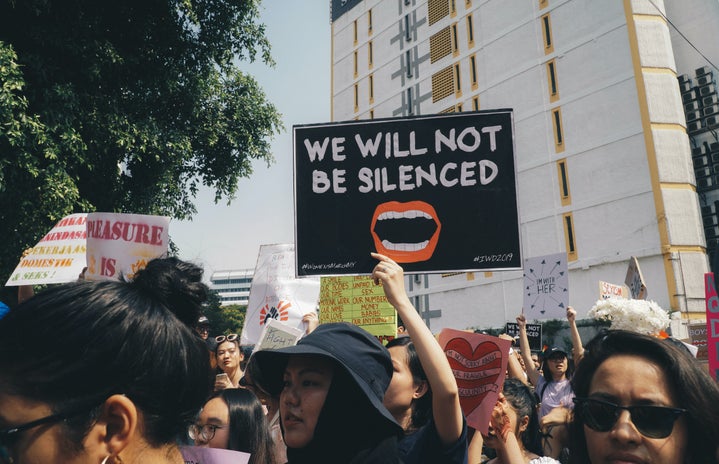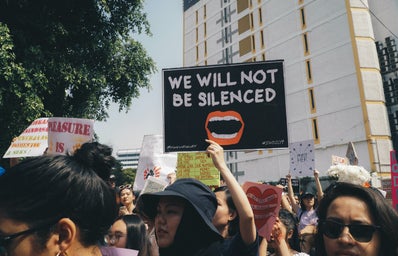Arwa Mahdawi referred to the recent rise in voluntary celibacy as “the great sex recession”. A survey of 1500 participants by the Kinsey Institute found that 16.5% of the women surveyed described themselves as single by choice and sexually inactive. Culturally, there seems to have been a shift in feminist priorities: sex-positive feminism is becoming less fashionable, as women across the world are feeling alienated by hookup culture, angry at institutionalised misogyny, and alarmed at men’s ambivalence to the growing crisis of violence against women. Women’s concerns only grew with the success of Trump in the US election and the trend of celibacy has now become a political choice. Of course young women aren’t interested in hooking up right now, our bodily autonomy is at stake. Who wants to have a slut phase when the threat of male violence is so huge? What choices do we have?
Developing in the mid-to-late 2010s, the 4B movement emerged as a response to male violence and inequality in South Korean society. 4B calls for ‘bihon’, which means no heterosexual marriage; ‘bichulson’, no childbirth; ‘biyeonae’, no dating; and ‘bisekseu’, no heterosexual sexual relationships. The South Korean feminist scholar Euisol Jeong explained, “a key aspect of the 4B movement is its encouragement for women to question the heterosexual, reproductive lifestyle, which is often treated as natural and unquestionable.” In 2023, the Korea Women’s Hotline reported that a woman runs the risk of being killed by her husband or male partner every 19 hours. After Trump’s victory in the US election Google searches for “4B” spiked. American women responded to Trump’s victory with fear and distrust, feeling disappointed that voters had elected a candidate who they felt did not respect their reproductive rights and was even found liable for sexual abuse in 2023. Seeking comfort and community online, young American women suggested taking inspiration from South Korean feminists and the 4B movement.
This interest in boycotting men is not new. Valerie Solonas’ radical feminist text SCUM Manifesto, published in 1967, argued that men have ruined the world and that the only possible solution to society’s ills is to “DESTROY THE MALE SEX”. In the late 1970’s, the Leeds Revolutionary Feminist Group presented a paper called ‘Political lesbianism: the case against heterosexuality’. While many feminists have criticised these stances, suggesting that they are overly simplistic, utopian, or even misandrist, few have denied the problematic side effects and oppression women face as consequences of heterosexual relationships. Boycotting men could be considered a viable option in escaping male violence on a personal level, and rising rates of celibacy show us that many women are choosing this over misogyny.
Cosmopolitan’s Lois Shearing told readers that the hottest sex trend right now is “abstaining from it.” Julia Fox, actress and It Girl, has spoken openly about her choice to be celibate since the overturning of Roe V Wade. Earlier this year, the dating app Bumble received enormous backlash after dropping their USP (of women messaging first) and running promotional billboards poking fun at the recent ‘trend’ of celibacy, with one billboard reading “You know full well a vow of celibacy is not the answer.” Critics felt Bumble’s clunky attempt at rebranding failed to acknowledge, and even dismissed, the reasons why women were choosing celibacy. Bumble later apologised, but the marketing failure emphasised exactly why women are being drawn to celibacy: if the dating app focused on protecting women against creepy opening messages from men felt they had to rebrand, do women have any hope in safely dating heterosexual men?
Just like the political lesbianism of the 70s, the 4B movement has its detractors: some feminists have concerns over whether the movement overlooks heterosexual women’s desires as a method of punishing men. Others also wonder whether it is a particularly productive way to engage in feminism, as rather than challenging patriarchal systems, it instead establishes a complete disconnect with men, pushing meaningful conversations further and further out of the picture. But women across the globe feel at breaking point, disenfranchised and demoralised by rampant misogyny. In the UK, the NPCC declared violence against women and girls an epidemic, with 1 in 12 women a victim of sexual violence per year. Violence against women and girls has also been described as a global public health pandemic by the World Health Organisation. It’s no wonder the 4B movement is sparking interest. Post-election, far-right political activists in the US began posting misogynist messages on X, such as the statement, “Your body, my choice.” Trump’s election allowed these men to feel vindicated in their misogyny, and comfortable publicly sharing their desires to assault women online. Women are seeing men across social media threatening rape, so no wonder we’re considering celibacy. Threats of sexual violence aren’t exactly an aphrodisiac. With limited options when it comes to systemic change, boycotting men and the 4B movement can act as a way for women to reclaim power and autonomy; and in a time where women’s reproductive rights are being threatened, no wonder hookup culture and heterosexual relationships aren’t our top priority.


